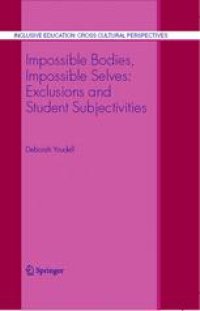
Ebook: Impossible Bodies, Impossible Selves: Exclusions and Student Subjectivities
Author: Deborah Youdell (auth.)
- Tags: Higher Education, Educational Policy, Education & Society, Sociology
- Series: 3
- Year: 2006
- Publisher: Springer Netherlands
- Edition: 1
- Language: English
- pdf
This book looks inside the school to examine how every-day, school-level processes act to place particular students 'outside' the educational endeavour and argues for new strategies for thinking critically about and interrupting educational exclusions and inequalities.
Looking across national contexts and drawing on ethnographic studies of schools in the UK and Australia, the book explores the implications of the contemporary education policy context and processes and practices inside schools for students as learners and for educational inequalities.
The book uses tools offered by post-structural theory to read ethnographic data and show how the discourses that circulate inside schools at once mobilize and elide gender, sexuality, social class, ability, disability, race, ethnicity, religious and cultural belongings at the same time as they open up and close down 'who' students can be as learners.
In demonstrating these processes the book offers new insights into how these 'truths' about students and learners are created and how they come to be bound so tightly to the educational inclusions, privileges and successes that some students enjoy and the exclusions, disadvantages and 'failures' that other students face.
This book looks inside the school to examine how every-day, school-level processes act to place particular students 'outside' the educational endeavour and argues for new strategies for thinking critically about and interrupting educational exclusions and inequalities.
Looking across national contexts and drawing on ethnographic studies of schools in the UK and Australia, the book explores the implications of the contemporary education policy context and processes and practices inside schools for students as learners and for educational inequalities.
The book uses tools offered by post-structural theory to read ethnographic data and show how the discourses that circulate inside schools at once mobilize and elide gender, sexuality, social class, ability, disability, race, ethnicity, religious and cultural belongings at the same time as they open up and close down 'who' students can be as learners.
In demonstrating these processes the book offers new insights into how these 'truths' about students and learners are created and how they come to be bound so tightly to the educational inclusions, privileges and successes that some students enjoy and the exclusions, disadvantages and 'failures' that other students face.